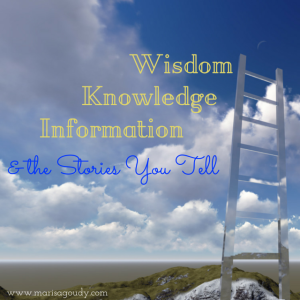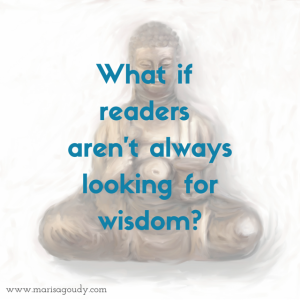What do your readers expect: wisdom or knowledge?
The Sovereign Standard, Issue 6
At a time when information is increasingly cheap and wisdom increasingly expensive, this gap is where the modern storyteller’s value lives.
 For this week’s Sovereign Standard, I was tempted to just send a link to Wisdom in the Age of Information and the Importance of Storytelling in Making Sense of the World: An Animated Essay by Maria Popova and introduce it “what she said.”
For this week’s Sovereign Standard, I was tempted to just send a link to Wisdom in the Age of Information and the Importance of Storytelling in Making Sense of the World: An Animated Essay by Maria Popova and introduce it “what she said.”
Even that title teaches you something:
Wisdom is foremost. Though we live in an Age of Information, the world doesn’t make much sense, but storytelling will help.
But, as these insights started lighting up my online and offline experience this week, I found there was something more to say. Is it wise? You tell me...
The Ladder of Understanding
Popova offers a brilliant metaphor: the “ladder of understanding.” (Turns out she’s applying Plato to our contemporary culture of noise.)
Information is everywhere - all those facts and figures and Wikipedia articles. Knowledge is the next step up - you synthesize all that information to “reveal some truth about the world.”
At the top of the ladder: wisdom. From this vantage point, you're sculpting what’s known into what matters. Through wisdom, Popova says, we understand not only how the world works, but we also present an aspirational vision of how it could work.
 Actually, she said “how it should work” but I do everything I can to avoid that word.
Actually, she said “how it should work” but I do everything I can to avoid that word.
There are moments when we crave “should” - like when you go to a trusted advisor praying they'll tell you just what to do. (The best ones will do no such thing.) The problem arises when people who have not earned the right to give such advice start doing so. Brene Brown speaks masterfully about this.
Look at the “should” problem in the context of the Age of Information and the online world: so many people who are better suited to dole out information and facts are trying to jump a few rungs of the ladder. They are moralizing - and “shoulding” - before they have the credibility and experience to impart real wisdom.
What do you share: information, knowledge, or wisdom?
Examining the Ladder of Understanding , the thought-leader-in-process leaps up waving her hands “wisdom, wisdom! I wanna share wisdom!” (Me too, brothers and sisters, me too.)
Looking at my own position, I worry that I haven’t produced enough content, and I haven’t fully birthed my signature theme in a coherent, public way. Maybe I should (eek! “should”!) put a lid on all this blogging and just cogitate on the Bigger Story a while longer if I hope to offer up any worthy wisdom.
Thank goodness Tara Mohr talked me out of that. In this wide-ranging interview (the most compelling and useful one I’ve heard her give as she promotes Playing Big), she nails that tendency to hold back and over prepare.
Mohr invites you to squash that desire to do a little more research, training, contemplating. Decide “I know enough” and get out there to speak, to launch, to interact…
“Wisdom” May Not Always Be the Right Answer
 The chronic perfectionist and overachiever (is your hand raised for that too?) sees the top as the goal. If knowledge is only halfway up the ladder then it must not be good enough. And mere information? Ugh. That can’t be the realm of the creative entrepreneur.
The chronic perfectionist and overachiever (is your hand raised for that too?) sees the top as the goal. If knowledge is only halfway up the ladder then it must not be good enough. And mere information? Ugh. That can’t be the realm of the creative entrepreneur.
But are we all supposed to be climbing the ladder to the tippity top to dispense wisdom like a guru on high? Is there room up there or will too many soothsayers make that ladder topple right out of the sky?
After all, we still need that basic “how to” content to help us in anything from baking a cake to formatting a WordPress post to the basics of blogging.
And there’s great merit in collecting and organizing ideas in order to let people make up their own minds. Moralizing has its place, but sometimes it’s important to merely raise awareness and trigger curiosity. Trust your reader to refer to their own internal compass.
This week on the blog I explored the choices we have as individuals and as content creators. Every time you sit down to write you get to decide everything from the tone to the ultimate call to action. Some days a list post, some days a story that gets to the heart of the big questions.
But When You’re Called to Tell a Real Story…
A great storyteller is the kindly captain who sails her ship with tremendous wisdom and boundless courage; who points its nose in the direction of horizons and worlds chosen with unflinching idealism and integrity; who brings us somewhat closer to the answer, to our particular answer, to that grand question: Why are we here?
Popova brings her message home by employing the storyteller who navigates the deep waters of wisdom. Certainly, this is someone we can all aspire to be. Maybe not today, maybe not in that very next blog post, but certainly there are moments when you’re called to tell a story that bigger and bolder than any you’ve told before.
Godspeed on that journey.
 And yet, keep in mind what Mr. Hendrix said (or might have said): "Knowledge speaks, but wisdom listens."
And yet, keep in mind what Mr. Hendrix said (or might have said): "Knowledge speaks, but wisdom listens."
In the giving and receiving of story and silence we reveal the deepest wisdom of all.
This post was sent to Sovereign Standard subscribers first. To join our community of readers and contributors, please subscribe here.
